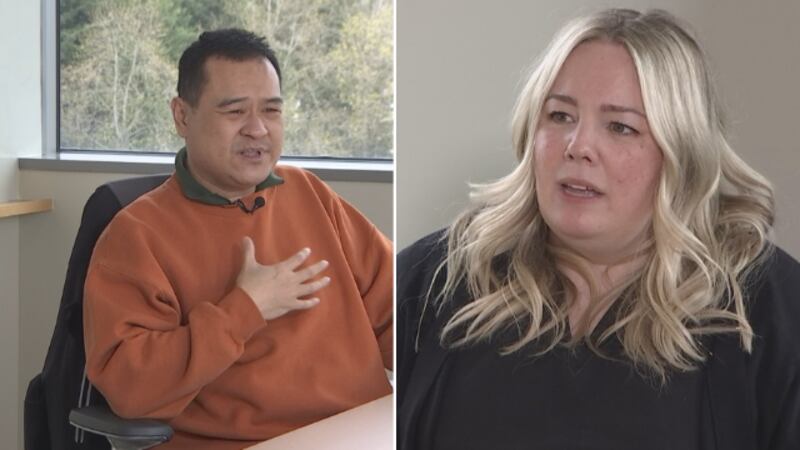An Overlake nurse said she was just doing her job when she saved a man having what’s known as a widowmaker heart attack.
But that man said she was the right person in the right place at the right time.
“Do you ever think of your purpose? Do you have a specific purpose? In your life?” nurse Katie Bickell asked. “That moment — it was perfectly timed.”
That moment was at The Pumphouse Bar & Grill in Bellevue back in March. Bickell knows it could have easily not happened at all.
“I will probably remember this every single time I come here,” she said.
One of Bickell’s friends left the restaurant early, so she changed seats. Only then did she notice a man across the room.
“[He was] rubbing his wrist and then would kind of go wipe his forehead,” she said. “And his color was awful.”
Bickell is a cardiac device nurse, so she works with people with heart problems.
She said he wasn’t grabbing his chest or doubling over, but she was “pretty certain he was having a heart attack.”
And, stranger or no stranger, she couldn’t just sit back and watch. After a few more minutes, she walked over to his table with a mask on.
Bickell explained she was a nurse, put her hand on his back, and found he was sweating significantly. Would he go to the emergency room?
“Inside I’m like, ‘This is very wrong, and he needs to go to the emergency room ASAP,’” she said. But she remained calm to try to keep him calm.
David Toh had finished karate practice about an hour before.
“Did you ever think in those moments this could be a heart attack?” KIRO 7 reporter Linzi Sheldon asked.
“No, never,” he said.
Toh had even pulled over on the drive to the restaurant because he was feeling nauseated. He thought about going home instead of meeting his friends, a move that could’ve been a death sentence. Then he decided he might feel better if he ate some food at The Pumphouse.
“What did it feel like for you?” Sheldon asked.
“Just a bad asthma attack that I’m used to,” he said. “Shortness of breath.The chest pain from having coughed violently … things like that. The nausea feeling.”
“I said, ‘I don’t think this is asthma. You look very uncomfortable, and I’m really concerned,’” Bickell said of their encounter.
After a few more questions, Toh’s friends agreed to take him around the corner to Bickell’s workplace, Overlake Medical Center.
Little did Toh know, his left coronary artery was completely blocked. Plaque had built up, narrowing the artery and causing a crack in the lining. When a blood clot formed, it prevented blood flow to the entire front wall of the heart.
“You have about four to six hours from when it closes to get it open if you’re going to save the muscle,” Overlake cardiologist Thomas Amidon said.
Amidon said that means what Bickell did was crucial.
“Katie really shortened that time from the onset of symptoms to getting to the hospital,” he said.
Amidon operated on Toh, inflating a balloon and embedding a stent into the artery’s walls. It restored blood flow quickly. And it’s why KIRO 7 was able to reuniteToh and Bickellat the hospital.
“Can I give you a hug? I’m so glad to see you!” Bickell exclaimed.
“Thank you,” Toh said, smiling.
“I’m so glad to see you,” she said. “I’m probably more emotional than you, but I’m just so glad to see you, and you look so good.”
It was their first time sitting down to talk about the experience.
“She’s my savior!” Toh said. “Pretty much, you know. I owe my life. … Even if Katie came over after an hour, it would’ve been worse. I might have collapsed.”
Amidon said heart attacks aren’t usually sharp stabbing pain — like you see in the movies.
“[It’s] burning, tightness, pressure, heaviness, oftentimes confused with heartburn and acid reflux,” he said. “If it’s severe, if it’s out of the ordinary, if it’s abrupt, if it follows exercise as opposed to following a meal, that’s when you think about your heart.”
Risk factors include age, diabetes, high blood pressure, high cholesterol, and smoking, he said.
“Is it possible for you to have heart disease and really never know it until you have a moment like this?” Sheldon asked.
“Yes,” he said, “and this is a good case example of that.”
Heart disease is the country’s leading cause of death for women and men.
And Toh knows without this chance encounter with Bickell, he could have been one of them.
“Words can’t express how much, how grateful I am to you for being there at that specific time,” he told her.
“It just makes me ... so thankful,” she said.
“Me too,” he said.
In 2020, Overlake saw a reduction in people visiting the emergency room and having annual exams.
The hospital wants to encourage people to come in for checkups, investigate any symptoms and not be afraid to visit the hospital due to COVID-19, as it has plenty of precautions in place.
Toh is now doing cardiac rehab and hopes to return to karate eventually.
Cox Media Group







